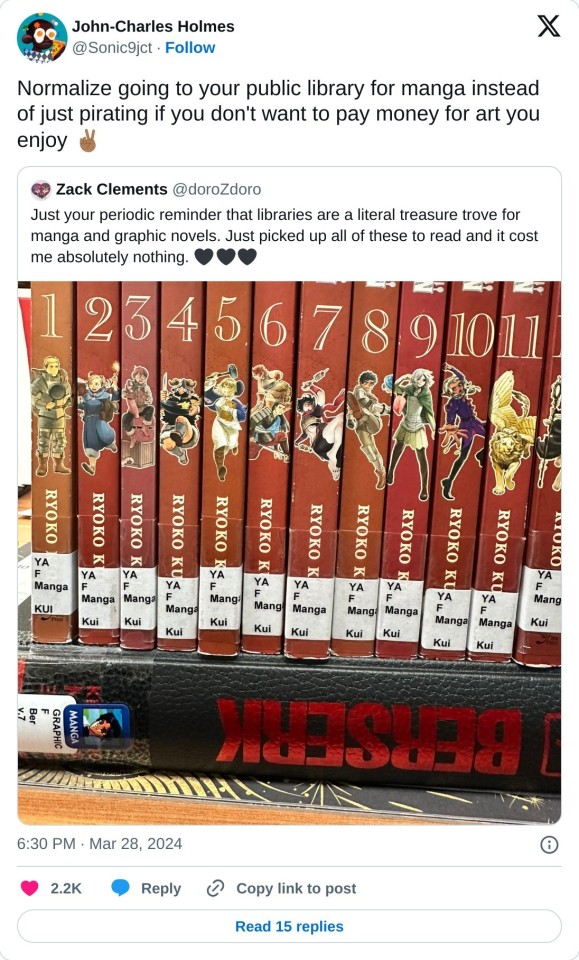#cookingwithsenshi
Text
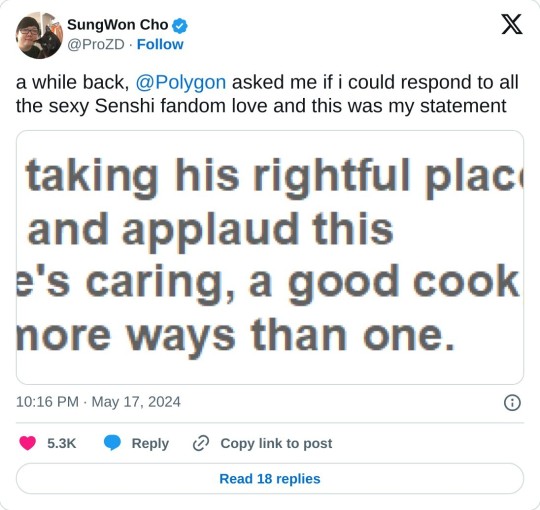

#voice actors#quotes#interviews#reactions#fandoms#fanboying fangirling#humor#cookingwithsenshi#ProZD
3K notes
·
View notes
Text
Dungeon Meshi Cooking game beta test!!
41 notes
·
View notes
Text
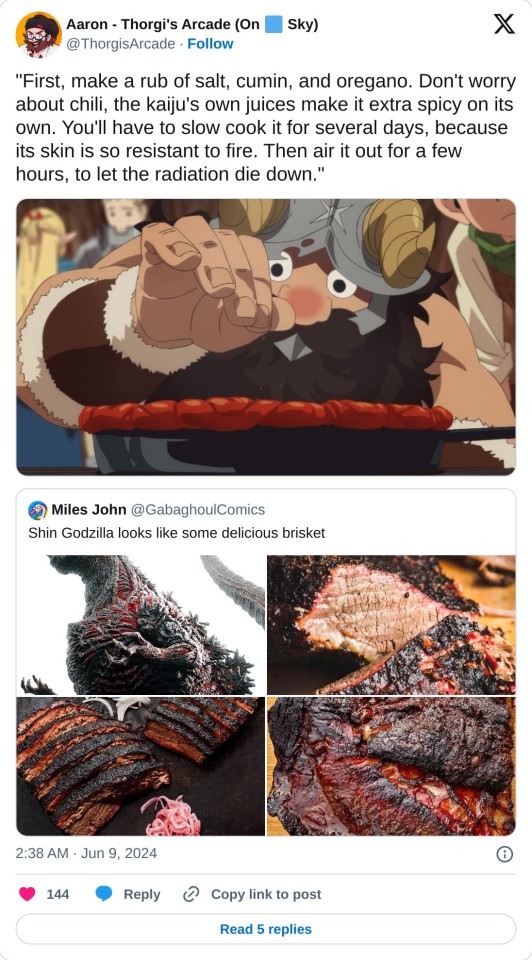
#professor thorgi#headcanons#humor#godzilla#kaiju#tokusatsu#crossovers#cooking#recipes#food#cookingwithsenshi
480 notes
·
View notes
Text

#figure collecting#nendoroid#senshi#delicious in dungeon#dungeon meshi#cookingwithsenshi#painted prototype reveal
34 notes
·
View notes
Text
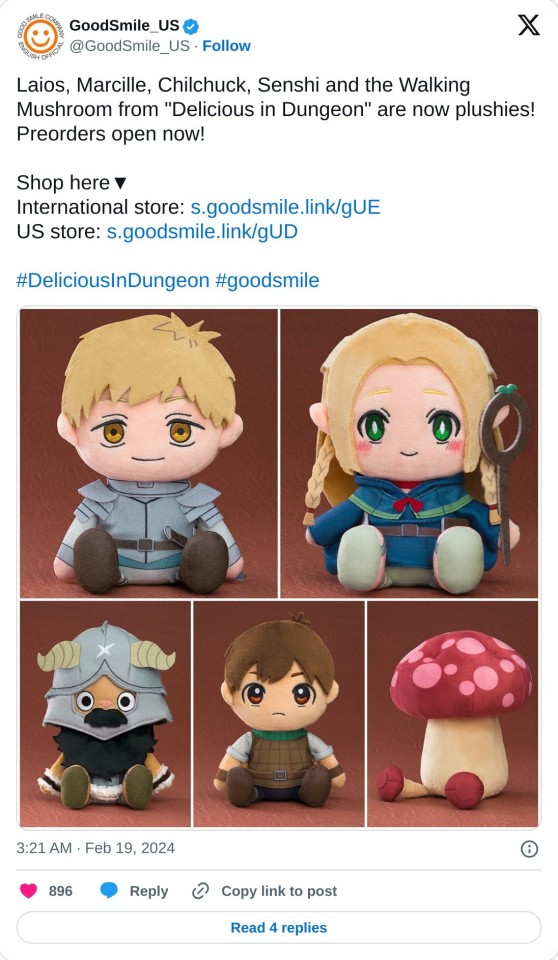
Look at that Senshi plushie!💖 Look at that Walking Mushroom!🤣
#delicious in dungeon#dungeon meshi#plushies#good smile company#announcements#chibi#reactions#cookingwithsenshi
25 notes
·
View notes
Text

17 notes
·
View notes
Text
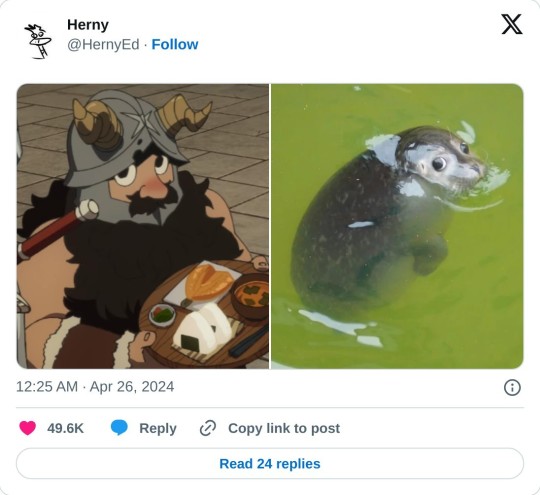
#senshi#seals#comparisons#screengrabs#animals#marine life#cookingwithsenshi#humor#facial expressions
14 notes
·
View notes
Text
If figure makers start selling static scales of chimera-Falin, then i hope they also look into more Claymore figures. This is an untapped market. And i need Awakened Being Claymore figures.🙏
7 notes
·
View notes
Video
youtube
I HATE fantasy... but Dungeon Meshi... by AlleyDreamer
#youtube#fanboying fangirling#dungeon meshi#delicious in dungeon#cookingwithsenshi#video essays#i watched this yesterday and she just gushes over the series It's great
5 notes
·
View notes
Text
youtube
Senshi And The Power Of Environmentally Conscious Farming | A Dungeon Meshi Video Essay by seacanary
#video essays#delicious in dungeon#dungeon meshi#ecological#environmental#fanboying fangirling#cookingwithsenshi#Youtube#farming#agriculture
3 notes
·
View notes
Text
youtube
Suit Up! | Delicious In Dungeon Ep 1x10 Reaction & Review | Netflix by Nerdy Daily
I did not expect a whole discussion about how current day people regard Sincerity by calling it "cringe". To me, Chilchuck called Laios's sincerity "cringe", because it's only one syllable (if you say it fast enough), and that's just easier to fit into the lip flaps when you dub anime. But also, I never thought of Chilchuck's reaction as anachronistic, because I'm just so used to that trope and his archetype in anime. There's always the usually-tsundere character, who tries so hard---too hard---to act mature, level-headed, and never show any vulnerable emotions. They're the ones always shouting that the earnest (usually Shonen protagonist) character's sincerity is "embarrassing". I had gotten used to it as a common set of anime tropes. But I never thought to look at it through the lens of current-day derision of Sincerity, Earnestness, and emotional vulnerability, as "cringe". Interesting.
0 notes
Text
Recently, I watched YouTube reaction channels react to the episode of Dungeon Meshi when Marcille's walking-on-water spell didn't work on Senshi because his beard was too dirty. It reminded me of several cultural differences in ideas about magic, that have appeared in manga, anime, and Japanese videogames.
The only reason I could think for Senshi's dirty beard to be a factor in Marcille's spell not working, was remembering that in Shintoism, cleanliness is literally "next to godliness". Cleaning one's body is also seen as a spiritual purification, and often part of a lot of religious ceremonies. And since religious figures, like miko, are sometimes considered to have mystical powers in media, because of their closeness to the divine, their emphasis on purification has linked purity/cleanliness to magical powers. So it's possible that all the muck and blood of other creatures, soaked into Senshi's beard didn't contain some (cursing) power in and of themselves that negated Marcille's spell. It could simply be that Senshi's beard being dirty and "unpure", negated any connection to divine power, thus negating magic. (Is that also why peeing on the spirit monsters in Death Stranding defeats them?)
One reoccurring idea that took me a while to wrap my Western mind around, was the idea that sealing a spirit/creature, didn't necessarily mean sealing the ENTIRE spirit's/creature's being away. In the Yuji Shimomura movie "Death Trance", the protagonist is followed around by a little girl, who is revealed to be the war goddess, but transformed into a little girl version of herself, after her power was sealed away, separately from her. When the coffin containing her power is finally unlocked, the little girl version of herself climbs inside, rejoins her power, and emerges as her fully-powered, adult version. In the manga "By the Sword" ("Yo-u") by Sanami Matoh, the protagonist group includes a tiny demon, who is the version of the demon left behind after his power was sealed away. (When in contact with a magic sword, that tiny version of the demon is able to possess the body of his daughter, during combat.) In Devil May Cry 5---SPOILERS!!!---the character V is revealed to be the human part of Vergil, separated from Vergil's demon side, which manifested as the demon "Urizen". Later in the game, V reunites with Urizen, and after they merge, Vergil reappears in their place. This same concept may even be the origin of the Nobodies in Kingdom Hearts II. In the Kingdom Hearts games, a Nobody is a new being created from the body left behind, after a heart is wrapped in darkness and becomes another being called a Heartless. In Western media, when a demon or any type of spirit is sealed away, its entire soul, it's entire being is thought to be behind a seal or disallowed from entering the human world. So it took me a long time to understand the concept of sealing away a demon's/spirit's power ALONE, while the rest of its soul remained, existing in a diminished version of itself.
Another idea that didn't exactly translate as-is to Western audiences, was an instance in Kingdom Hearts: Birth by Sleep. When Snow White's Evil Queen is enraged, right before the boss fight with the Magic Mirror, the original Japanese version of the game has the queen glow, while she is enraged, the Magic Mirror mirrors her glow, then becomes empowered with more evil magic to become a game boss. But in the official English release of the game, the scene is changed so that the Evil Queen throws a potion bottle onto the Magic Mirror, to explain why it suddenly became empowered with more evil magic. Maybe I'm wrong, or had been watching too many yokai anime, but the original version reminded me of tsukumogami. In Japanese folklore, tsukumogami are everyday objects that can come to life with their own spirit, usually after existing for a long time. I've noticed a reoccurring idea that sometimes the nature of the spirit in a tsukumogami, depends on the energy/emotions it was surrounded by, for the majority of its existence. An object treated badly and surrounded by death or malice, will become an malevolent spirit. Likewise, an object surrounded by positive emotions or having love focused on it often, can become a benevolent spirit. It seemed that the Magic Mirror taking on the Evil Queen's negative emotions could translate to Western audiences, since it is literally a mirror and mirrors can reflect and take on the appearance of what they see. But the moment was so quick in the game's cutscene, I could see how the Evil Queen throwing a potion would seem to make more sense, whereas a Japanese audience would likely more immediately notice that the Magic Mirror was absorbing/mimicking the negative energies of the Evil Queen, thus increasing its evil power for a sudden boss fight.
Years ago, when I watched Hellsing (the first anime series), it always struck me as odd when Father Anderson pinned religious scripture pages to all the walls, surrounding the area where he was fighting Alucard. I grew up Roman Catholic and had never seen media depictions of Western Catholic exorcists using individual pages of paper scriptures to exorcise demons. (Usually, they say prayers aloud or use holy objects, that were more than single sheets of paper.) I was introduced to the idea of fighting demons with holy pieces of paper, from anime: ofuda talismans from Sailor Mars; miko and onmyouji slapping paper talismans onto people's foreheads to exorcise them of demon possession, or to diminish a demon's power. I wondered if Father Anderson's use of holy pages was actually inspired by the use of paper talismans in Japanese media. (I think I tried to look up if Christianity had a history of pinning Bible pages to walls to purify areas, but may have only found something vague about Jewish paper talismans. I don't remember; it was a very long time ago.)
Whenever something in an anime's/manga's/videogame's magic system doesn't make immediate sense, it's always interesting to me how it might make better sense, in terms of Japanese folklore concepts. It's always even more amusing when the setting seems very Western.
#mythology folklore myth legends#speculation#cookingwithsenshi#death trance#by the sword#queendomcardiac#mousemonarchy#hellsing000#magic systems#demonnevercare
0 notes
Text
Am I going to regret not preordering any Dungeon Meshi Nendoroids? I was about to preorder Senshi, but I'm a cheapskate, and I'm not THAT obsessed with the series. But I do like it. It is fun. And wouldn't it have been nice to have a little Senshi figurine, encouraging me to cook? He releases October 2024, so maybe I'll pick him up from Good Smile US's Available Now section, after he releases. Maybe?
0 notes
Text
💪💪💪💪💪🍲😋
AlleyDreamer (who does power lifting) noted that Laios is built like a power lifter. (https://youtu.be/usuWBCkHSrg?si=qRS-H4hEH9qIQyfA)
If I recall correctly, actors say they have to deprive themselves of water to get the superhero look. Movie superhero bodies are not actually healthy. But we've all been fooled into thinking that's what a strongman looks like.
0 notes
Text

People are doing what now????
I thought western otaku fandom had long accepted that anime/manga is just going to have multiple names, not just because of localizations, different translations, but also because Japanese fandoms also give series nicknames: KareKano, Kodocha, HeroAca, etc.
I've been around to see manga get passed around to different licensors, and official title translations change several times. And some anime get licensors different from the manga of the same series, so they either must use a different title or they just disagree on what an official translation of the title should be. That's why now some licensors give up and expect you to just learn the Japanese titles. Like "Kimi ni Todoke" and "Natsume Yujin-cho".
And then there are the anime and manga that got popular thru fansubs and fan scanlations, long before an official licensor released them in our region. Fandom communities are just used to different names from the fan subs/scanlations, vs official releases. But also because different fan subbers/scanlation groups will translate the same series title in different ways. We just learn all of them.
Are kids these days just complaining about having to search/use multiple tags? I know i do sometimes, but believe me, just 2 titles---"Dungeon Meshi" and "Delicious in Dungeon "---are EASY and NOT worth complaining about.
Is this because Dungeon Meshi is on Netflix? Are non weebs, new to anime, complaining about multiple titles in Delicious In Dungeon fandom? My advice: just think of it as how Americans try to turn every phrase into an acronym or initialism. I think the Game of Thrones fandom often used the tag "GoT" instead of the full name.
0 notes
